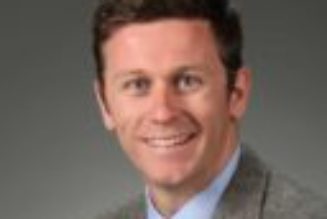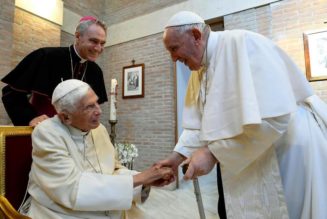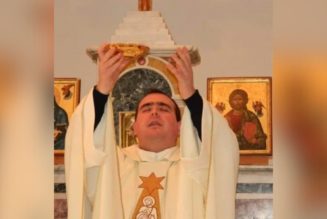
The philosopher Alasdair MacIntyre once described humans as “dependent, rational animals,” arguing in his text that, as creatures, we need the virtues. This makes sense, because none of us is really “independent” or “self-sufficient.” Each of us is imperfect. We need others to complete and support us. They need us for the same reason. In the biblical worldview, this isn’t an accident. It’s a matter of God’s design. The virtues shape us in moral maturity and give us the ability to live fruitfully in community . . . all of which I remembered this past week when I received the following note from a veteran priest friend:
Fran,I’ve been reading your thoughts in True Confessions to great profit. One of the book’s underlying themes is that we’ve moved into a time when the energies that enliven the Church are outside the normal parish and diocesan structures. It will be that way for the next twenty years at least, as those structures weaken. We’re already suffering from a lack of available leaders, clergy-wise, in their 60s and 70s. The same is true for men in their 50s. More alarmingly, the total numbers of priests in their 30s and 40s is dramatically small—and among them, many of those who have a natural capacity for leadership are polluted by the corrosive politics and culture of the digital age. Some of them will be capable leaders in a sectarian sort of way, but not really Catholic or catholic.
If I think of my own years in ministry on campus, the diocese was almost entirely irrelevant to my work. But groups like FOCUS [the Fellowship of Catholic University Students] were essential. All the pockets of Church vibrancy I see are lay-led and need nothing from the parish, save for the sacraments. I know dozens of exemplary Catholic families—I’ve done the weddings and baptisms for many—who go to the parish only for Mass and confessions. They organize their own schooling (home or various private options), men’s groups, women’s groups, Catholic scouting for children, summer camping adventures, etc. Their faith formation is by orders of magnitude better than what any parish can offer, and it’s typically provided by Word on Fire, the St. Paul Institute, the Augustine Institute, Ascension, Formed, Hallow, and so on. Many of those new ventures have priests as public faces (Bob Barron, Mike Schmitz) but the organizations are fundamentally lay. The National Catholic Reporter showed the way on that sixty years ago, and now First Things, The Catholic Thing, Catholic World Report, etc., are putting the same dynamic to a different end. (As are the sources of malformation, like Lifesite and their ilk.)
I’ve been fortunate to work in various environments where all of my superiors and colleagues are lay. My relationship with my own superiors in the Church is a legal/canonical relationship that has very little professional, personal, fraternal, or spiritual dimension. Clerical relationships tend to be relationships that are all authority and no inspiration.
In short, my priestly ministry, which is blessed to be sure, is enhanced by my lay collaborations and diminished by my clerical ones. If that’s the case for a priest, imagine how much more that’s true for the laity in the world.
So while I was interested in the episcopal and priestly interviews in your book, I think them far less relevant than the lay ones. There are several reasons that priestly vocations are way down across the board (internet porn is a big one), but I think one reason is that the evangelical “action” is not really in the clergy at this moment, but elsewhere. And so the zealous souls are going there.
Again, thanks for your good work on True Confessions.
Blessings,
Name withheld
So where am I going with this, beyond sneaking in a good word for a couple of books?
In the Catholic tradition, the word “hierarchy” derives from the Greek root word hierarkhes or “sacred ruler.” It suggests a kind of pyramid of Church teaching authority and pastoral leadership, with clergy at the top. The image is misleading. At their best, and working as intended, ordained leadership and authority—both of which are grounded in Scripture—function as a service to the people of God, not as a holiness elite or higher clergy caste. As Benedict XVI stressed many times, laypeople are not, and were never intended to be, “second-class citizens” in the Church. They’re fully co-responsible for her evangelical mission. And the text of the email above captures vividly what that means in action.
What the email doesn’t capture is this: Catholic life is an ecology. To borrow from MacIntyre, we depend on each other. The lay, clergy, and professed religious vocations all have different contents and tasks, but they all hinge on Baptism, and each needs the others. Without that mutual dependence, the Church and her mission grow weak. Which means that today’s active lay witness is a blessing. And the dwindling presence of priests is not, because Catholic life is profoundly sacramental, with the Eucharist at its heart and priests as its irreplaceable ministers. Simply put: no Church, no witness to the world; no Eucharist, no Church; and no priests, no Eucharist.
But there’s more: no committed Catholic families, no priests. We need more good priests. So maybe the most fruitful form of lay witness in the decades ahead is for Catholic couples to welcome more new life into their marriages; to raise their children in a zealous love for Jesus Christ; and to help their sons at least listen for a call from God to the priesthood. Because God never stops inviting. We just haven’t been listening.
Francis X. Maier is a senior fellow in Catholic studies at the Ethics and Public Policy Center and the author of True Confessions: Voices of Faith from a Life in Church.
First Things depends on its subscribers and supporters. Join the conversation and make a contribution today.
Click here to make a donation.
Click here to subscribe to First Things.
Image by Jan-Erik Løken, licensed via Creative Commons. Image cropped.








